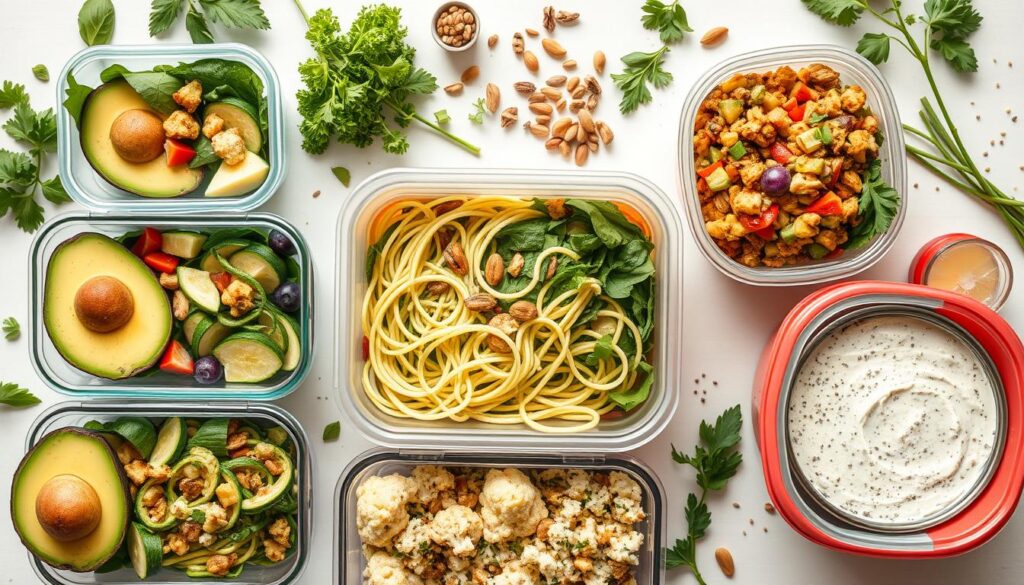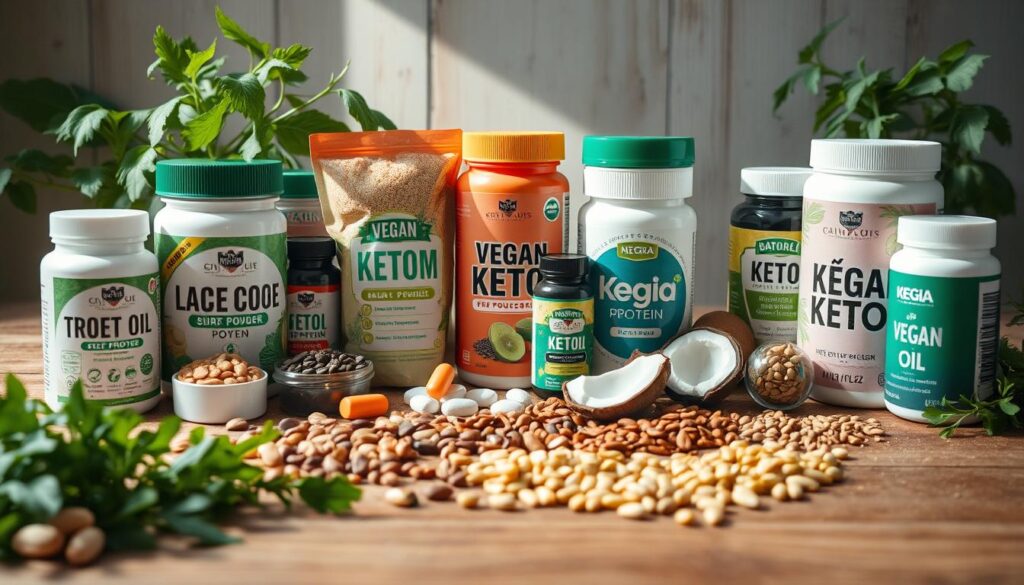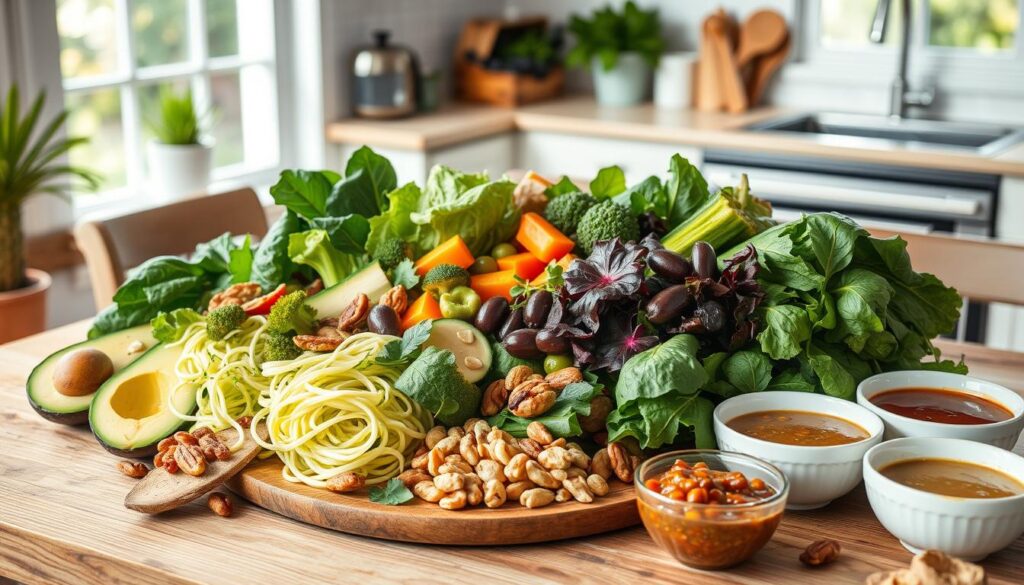The vegan keto diet is a mix of veganism and a ketogenic diet. It’s about eating plants and not animal products. This diet helps you lose weight and keeps your heart healthy.
This diet limits carbs to 35 grams or less a day. You eat lots of veggies, healthy fats, and plant proteins. This way, your body burns fat for energy instead of carbs.
Key Takeaways
- The vegan keto diet combines veganism and the ketogenic diet, focusing on low-carb, high-fat plant-based foods.
- This diet typically consists of 70-80% fat, 20-25% protein, and 5-10% carbohydrates from plant sources.
- Vegan keto diets have shown benefits for weight loss, heart health, and the management of various chronic conditions.
- Transitioning to a vegan keto diet requires careful planning to ensure adequate nutrient intake and avoid potential deficiencies.
- Consulting a registered dietitian can help ensure you meet your nutritional needs on a vegan keto diet.
Understanding the Basics of Keto Diet
Starting a vegan ketogenic diet is a big change. It mixes eating plants with the benefits of ketosis. Let’s look at what makes a vegan ketogenic diet special.
What Defines a Ketogenic State
The ketogenic diet makes your body use fat for energy instead of sugar. You eat very few carbs, about 20-50 grams a day. This helps your body burn fat.
Combining Veganism with Ketosis
Vegans can get into ketosis by eating lots of plant-based fats. Foods like coconut oil, avocados, nuts, and seeds are good. This diet is good for your health and the planet.
Macronutrient Ratios
The best mix for a vegan keto diet is 75% fat, 20% protein, and 5% carbs. You should eat whole, unprocessed plants. This keeps you in ketosis and gets you all the nutrients you need.
“A balanced vegan keto diet typically consists of 70-75% of daily calories from plant-based fats, 20-25% from vegan proteins, and 5-10% from carbohydrates.”
Health Benefits of Plant-Based Ketogenic Living</h2>
Starting
a vegan keto diet can bring many health perks. It mixes plant-based eating with low-carb ketosis. This combo helps with weight loss and lowers the risk of chronic diseases.
Research shows people on a <em>vegan keto diet lose more weight. They lost an average of 4.4 pounds more than others. This diet also lowers bad cholesterol and heart disease risk.
Vegans have a big advantage. They are 75% less likely to get high blood pressure. They also have up to 78% less chance of getting type 2 diabetes. This shows how good a <em>vegan keto diet is for your heart and blood sugar.
Studies also found that a low-carb diet, like keto, can fight heart disease. Adding a plant-based diet’s anti-inflammatory effects makes vegan keto very powerful. It’s great for fighting chronic diseases.
“Well-planned vegan diets are healthful and provide essential nutrients for all life stages.”
– Academy of Nutrition and Dietetics
It’s important to get all the nutrients on a vegan keto diet. You might need supplements. But with the right plan, you can see amazing vegan keto benefits. It can change your health and wellness for the better.
Essential Foods for Your Vegan Keto Journey</h2>
Startin
g a vegan keto diet is a big change. It’s a plant-based way to follow the keto diet. You need to eat foods that help you stay in ketosis. Let’s look at the main foods you should eat.
High-Fat Plant Sources
Healthy fats are key for a vegan keto diet. They make up to 75% of your calories. Use coconut oil, olive oil, avocado oil, and MCT oil for fats.
Nuts and seeds like almonds, walnuts, chia seeds, flaxseeds, and hemp seeds are also good. Avocado is full of nutrients. You can add it to salads, smoothies, and desserts.
Plant-Based Protein Options
For protein, eat tofu, tempeh, and seitan. Nuts, seeds, and vegan protein powders also help. Make sure your meals have the right mix of foods.
Low-Carb Vegetables to Include
- Leafy greens like spinach, kale, Swiss chard, and collard greens
- Cruciferous vegetables such as broccoli, cauliflower, Brussels sprouts, and cabbage
- Zucchini and cucumber for versatile low-carb options
- Bell peppers for their vitamin C and vibrant colors
- Asparagus and green beans as delicious side dishes
These low-carb vegetables are important. They give you fiber, vitamins, and minerals. They also keep your carb intake low.
Eating these vegan keto foods will help you succeed. Focus on plant-based fats and low-carb vegetables. This will help you enjoy the vegan keto lifestyle.
Foods to Avoid
Startin
g a vegan keto diet means knowing what to avoid. High-carb foods can stop you from being in ketosis. To stay on track, avoid these foods:
- Grains: This includes wheat, corn, rice, and other cereal-based products.
- Legumes: Steer clear of lentils, beans, peas, and peanuts.
- Sugar: Honey, agave, and other sweeteners should be limited.
- High-carb fruits: Apples, bananas, and other fruits with a high sugar content.
- Starchy vegetables: Potatoes, yams, and other carb-dense veggies.
- Processed vegan foods: Many meat substitutes and other processed plant-based items may contain hidden carbs.
The vegan keto diet wants you to eat mostly fat, some protein, and very little carbs. By avoiding these foods, you’ll get closer to ketosis. And you’ll stay true to your plant-based diet.</p>
<tbod
y>Vegan Keto Diet MacrosPercentageFat60-70%Protein20-30%CarbohydratesLess than 10%
Want to replace starchy foods? Try cauliflower rice, zucchini noodles, and foods high in fat like avocados and nuts. These swaps help you enjoy vegan keto without losing health benefits.
Transitioning to a Plant-Based Ketogenic Lifestyle
Starting a vegan keto diet is a big change. It takes time and careful steps to get used to it. Knowing how to handle the first week and how to check if you’re in ketosis helps a lot.
First Week Adaptation Tips
The first week is tough because your body misses carbs. Drink lots of water and think about adding electrolytes like sodium and potassium. Don’t cut carbs all at once. Doing it slowly helps avoid bad side effects like headaches and tiredness.
Common Challenges and Solutions
Finding food on a vegan keto diet can be hard. Learn about low-carb plants like tofu and nuts. Also, make sure you get all the nutrients you need, especially B12 and iron.
Measuring Ketosis as a Vegan
It’s key to check if you’re in ketosis as a vegan. Use strips, meters, or breath analyzers to see your ketone levels. This helps you adjust your diet and stay on track.</p>
Changing to a vegan keto diet is a journey. It needs patience and the right steps. By facing challenges head-on and keeping an eye on your progress, you can make it work and enjoy the benefits.
Meal Planning Strategies for Success
Starting a vegan keto diet needs good meal planning. This ensures you get the right nutrients and stay in fat-burning mode. Focus on high-fat, low-carb plant foods for a tasty and fulfilling.
Batch cooking is a smart move. Spend time on weekends or weeknights making big batches of stews, soups, and sauces. This way, you have healthy meals ready all week. Leftovers last 3-4 days in the fridge, and frozen meals can last longer without losing quality.
Advanced meal prep is also helpful. Prepare healthy vegan keto snacks and meal parts like roasted nuts, veggie noodles, and plant-based proteins. This makes quick, balanced meals easy when you’re in a rush. Carb Manager Premium has a 7-day Family-Friendly Keto meal plan with tasty vegan keto dishes.
Having a weekly meal plan helps too. Plan your meals, get your ingredients, and prep in advance. This makes switching to a plant-based keto diet easier. Remember to focus on low-carb, high-fat, and moderate-protein meals.
- Plan low-carb, high-fat, moderate-protein meals
- Get ingredients from local markets or meal prep services
- Prep parts like sauces, dressings, and roasted veggies in advance
Using these strategies, you can confidently follow the vegan keto diet. Start with small changes and build up. This makes it easier and more lasting.

| Meal | Vegan Keto Recipe |
|---|---|
| Breakfast | Keto Avocado Breakfast Boats |
| Lunch | Keto Lemon Chicken Meal Prep |
| Snack | Keto Trail Mix |
| Dinner | Shirataki Noodle Stir-Fry with Low-Carb Veggies |
With these meal planning tips, you’re set for success on your vegan keto journey. Enjoy tasty, healthy plant-based keto recipes that keep you full and energized.
Smart Substitutions for Animal Products
Starting your vegan keto journey? You’ll find many plant-based options to replace animal products. There are dairy-free milks, egg substitutes, and meat alternatives. The vegan market has grown a lot in the last ten years.
Dairy-Free Alternatives
Try different vegan milks like almond, coconut, soy, oat, and pea milk. Each has its own taste and nutrients. You can also use vegan yogurts and cheese made from nuts or coconut.
Egg Replacements
Finding egg substitutes can be tricky. But, flax seeds or chia seeds mixed with water work well. You can also buy egg substitutes from brands like JUST and Follow Your Heart.
Meat Substitutes
For meaty dishes, check out vegan meat alternatives. Use tempeh, seitan, tofu, and edamame for protein. They taste and feel like real meat, making your favorite dishes vegan keto-friendly.
These smart swaps keep your vegan keto diet high in fat and low in carbs. Try different products to find what you like best.
Nutritional Considerations and Supplements
Starting a vegan keto diet is exciting but needs careful planning. You must watch out for nutrient deficiencies. It’s key to listen to your body and make sure you get all the nutrients you need.
Vitamin B12 is very important for making red blood cells and keeping your brain working right. Vegans often need to take this vitamin because it’s mostly in animal foods. Vitamin D is also crucial for strong bones and a healthy immune system. You might need to take this vitamin, especially when it’s cold outside.
Omega-3 fatty acids are good for your heart and brain. You can find them in flaxseeds, chia seeds, and walnuts. Don’t forget about iron and zinc too. These minerals help you have energy and stay healthy.
It’s a good idea to talk to a doctor or a dietitian before starting a vegan keto diet. They can help you make a plan that’s right for you. This way, you can stay healthy and reach your goals.

“Proper supplementation can be a game-changer for those following a vegan keto diet, helping to fill any nutrient gaps and support overall well-being.”
By paying attention to what you eat and taking supplements when needed, you can do great on a vegan keto diet. You’ll feel good, manage your weight, and have better health overall.
Sample Weekly Meal Plan for Vegan Keto Diet
Creating a tasty vegan keto meal plan is simple. Start with breakfasts like creamy chia seed pudding or a savory tofu scramble. Lunches can be an avocado salad or coconut curry soup. For dinner, try cauliflower rice stir-fry or zucchini noodles with vegan pesto.
Snacks like nuts, seeds, coconut yogurt, or celery with almond butter are great too. They help you stay on track.
Success comes from using a variety of plant-based, low-carb foods. Plan your meals to get enough protein, healthy fats, and fiber. Keep carbs low. The vegan keto diet is flexible, so change meals and snacks as you like.
Craving something savory or sweet? This vegan keto meal plan has it all. Enjoy creamy chia pudding or zesty tofu tacos. Discover endless flavors and nourishing ingredients for your body.
FAQ
<div>
What is a
vegan keto diet?
A vegan keto diet is a mix of veganism and the ketogenic diet. It uses low-carb, high-fat, plant-based foods. This helps the body burn fat instead of sugar.
What
is the ideal macronutrient ratio for a vegan keto diet?
The best mix for a vegan keto diet is 75% fat, 20% protein, and 5% carbs. Focus on whole, unprocessed plants.
</div>
<div>
What are the health benefits of a vegan keto diet?
A vegan keto diet can help you lose weight and lower disease risks. It also improves blood sugar and may fight inflammation. Vegans have a 75% lower risk of high blood pressure and up to 78% less type 2 diabetes risk.
</div>
What are the essential foods for a vegan keto diet?
Key foods for a vegan keto diet include avocados, coconut products, nuts, and seeds. Get protein from tempeh, tofu, and seitan. Eat leafy greens, broccoli, cauliflower, and zucchini. Berries are okay in small amounts.
</div>
<div>
What foods should be avoided on a vegan keto diet?
Avoid grains, legumes, sugar, high-carb fruits, and starchy veggies. Stay away from wheat, corn, rice, lentils, black beans, honey, agave, apples, bananas, potatoes, and yams. No animal products or hidden carbs in processed foods.
</div>
</div>
How can you transition to a vegan keto diet?
Starting a vegan keto diet can be tough, like the “keto flu.” Stay hydrated, use electrolyte supplements, and cut carbs slowly. Use urine strips, blood ketone meters, or breath analyzers to check ketosis.
</div> </div>
How can you meal plan for a vegan keto diet?
Plan meals with high-fat, low-carb plants. Batch cook, prep snacks, and make a weekly plan. Try coconut yogurt with berries, avocado and tofu salad, and cauliflower rice stir-fry with tempeh.
What are some smart substitutions for animal products on a vegan keto diet?
Use coconut milk or almond milk for dairy, flax seeds or chia seeds for eggs, and tempeh or seitan for meat. Make vegan cheese from nuts or coconut. Replace butter with avocado or coconut oil.
>Be careful to avoid nutrient gaps on a vegan keto diet. Watch for vitamin B12, vitamin D, omega-3s, iron, and zinc. You might need supplements, especially for B12 and D. Talk to a healthcare pro or dietitian to meet all your needs.


A Life-Changing Experience with This Weight Loss Supplement (Nagano Tonic)
I’ve always struggled with finding a weight loss solution that actually works for me. Like many, I’ve tried numerous diets, exercise routines, and supplements over the years—some worked for a short time, but nothing ever gave me long-term results. That was until I decided to try the weight loss supplement I found : Link to the Supplement.
From the moment I started using it, I noticed a difference. Not only did I feel more energized, but my cravings also became more manageable. The best part? I started seeing results much quicker than I anticipated! Over the course of just a few weeks, I noticed a significant reduction in belly fat and overall weight loss that I hadn’t been able to achieve before.
What makes this supplement stand out from all the others I’ve tried is how it supports me in my daily routine without any jitters or energy crashes. I’m able to stay focused and motivated, which has made it easier to stay on track with my diet and exercise plan.
This product truly exceeded my expectations, and I feel more confident and healthier than ever before. If you’re struggling with your weight loss journey like I was, I highly recommend giving this supplement a try. It’s been a game-changer for me, and I’m sure it can work wonders for you too!
Contant Them on email .. tonicnagano50@gmail.com
I’ve tried so many weight loss products over the years, but nothing worked like this supplement! Since I started using it, I’ve noticed a big difference in my energy levels and appetite control. In just a few weeks, I’ve lost weight and feel so much better. It’s been easy to stick with, and the results speak for themselves. Highly recommend this to anyone looking to make a real change!
wasn’t sure what to expect, but this weight loss supplement has really impressed me! After just a few weeks of use, I’ve already dropped a few pounds and feel more motivated to stay active. It’s helped curb my cravings and boosted my energy throughout the day. I’m excited to keep going and see even better results. Definitely worth trying!
Reach them on tonicnagano50@gmail.com
I was skeptical at first, but this supplement has truly made a difference in my weight loss journey. I’ve lost weight without feeling deprived or sluggish. My cravings are under control, and I feel more confident in my body. It’s easy to incorporate into my daily routine, and the results speak for themselves. I’m so glad I gave it a try!
Thanks David, i do use the link to make my purchase. you can get too here http://surl.li/iasppy
I’ve tried so many weight loss products, but this one has been by far the most effective. In just a few weeks, I’ve noticed a visible difference in my body and energy levels. It’s helped me stay on track without the constant hunger pangs and cravings. I’m really happy with my progress and can’t wait to see where I’ll be in another month!
This Nagano Tonic has been amazing! In just a few weeks, I’ve lost weight, feel more energized, and my cravings are under control. Highly recommend it!
Thats the link to purchase http://surl.li/iasppy